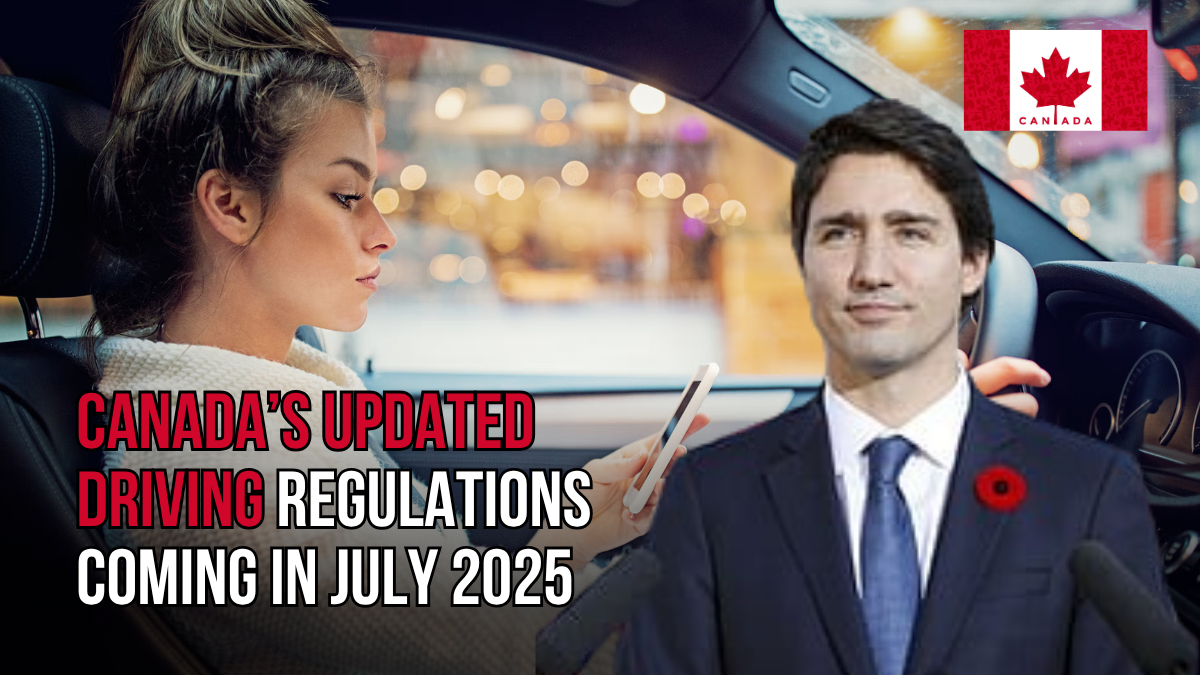Effective July 1, 2025, Canada is implementing significant changes to its driving laws aimed at enhancing road safety, promoting environmental responsibility, and standardizing regulations across provinces. These reforms encompass stricter penalties for distracted driving, mandatory eco-driving education, zero-tolerance policies for drug-impaired driving among specific groups, and more.

Summary Table: Canada’s New Driving Laws
| Policy Area | New Regulation | Effective Date | Official Source |
|---|---|---|---|
| Distracted Driving | Nationwide ban on handheld devices; fines starting at $600; license suspension for repeat offenses | July 1, 2025 | Transport Canada |
| Speeding Penalties | Zone-based penalties; increased fines in school and construction zones | July 1, 2025 | Transport Canada |
| Eco-Driving Education | Mandatory eco-driving course for new drivers | July 1, 2025 | Transport Canada |
| Drug-Impaired Driving | Zero-tolerance for drivers under 21, novice, and commercial drivers | July 1, 2025 | Transport Canada |
| Aftermarket Exhaust Modifications | Ban on exhaust systems exceeding 95 decibels | July 1, 2025 | Transport Canada |
| Interprovincial Data Sharing | Unified driver data-sharing system across provinces | July 1, 2025 | Transport Canada |
| Ride-Share and Delivery Drivers | Mandatory registration under “Public Use Commercial Drivers” classification; annual inspections required | July 1, 2025 | Transport Canada |
Detailed Breakdown of Changes
1. Stricter Penalties for Distracted Driving
Distracted driving remains a leading cause of accidents in Canada. Under the new laws:
- Fines for first-time offenders will increase to $950.
- Demerit points will rise from three to five.
- Repeat offenders within 12 months may face license suspensions of up to 30 days.
- AI-enabled roadside cameras will detect illegal phone use and automatically issue citations.
2. Speeding Reclassified Based on Zones
Speeding penalties will now vary depending on the zone:
- Double penalties in school zones, construction zones, and pedestrian-heavy areas.
- Potential increase of speed limits by 10 km/h in select rural and low-traffic areas, subject to provincial decisions.
3. Mandatory Eco-Driving Course for New Drivers
To promote environmental responsibility, new drivers will be required to complete an eco-driving certification course, covering:
- Fuel-efficient driving techniques.
- Vehicle maintenance for optimal performance.
- Understanding of vehicle load management.
Transport Canada aims to reduce carbon emissions from private vehicles by up to 12% through this initiative.
4. Zero Tolerance for Drug-Impaired Driving
A national zero-tolerance policy for THC detection will apply to:
- Drivers under 21 years of age.
- Novice drivers (G1, G2, M1, M2 license holders).
- Commercial vehicle operators.
Saliva-based roadside tests will be used as primary evidence, with failures leading to immediate 7-day suspensions and $2,000 fines.
5. Nationwide Ban on Aftermarket Exhaust Modifications
To address noise pollution concerns:
- Aftermarket exhaust systems exceeding 95 decibels are banned.
- Enforcement through enhanced vehicle inspections and noise-detection sensors.
- Repeat violators may face fines up to $5,000 and vehicle impoundment.
6. Insurance and Demerit Integration Across Provinces
A new national driver data-sharing system will:
- Ensure offenses committed in any province are reflected in the driver’s home province record.
- Allow insurers to access comprehensive driving histories, promoting fairness and accountability.
7. Tighter Rules for Ride-Share and Delivery Drivers
Ride-share and delivery drivers must:
- Register under the “Public Use Commercial Drivers” (PUCD) classification.
- Undergo mandatory annual vehicle inspections.
- Provide proof of commercial insurance.
- Complete a certified road safety module.
Companies like Uber and Lyft will be responsible for auditing driver compliance.
Frequently Asked Questions (FAQs)
Q1: Do I need to take any action to comply with the new laws?
A: Existing drivers should familiarize themselves with the new regulations. New drivers will be required to complete the mandatory eco-driving course.
Q2: How will the new distracted driving laws be enforced?
A: Enforcement will include AI-enabled roadside cameras that detect illegal phone use and automatically issue citations.
Q3: Are the new speed limits applicable nationwide?
A: Speed limit changes, especially increases in rural areas, will be determined by individual provinces.
Q4: What constitutes a violation under the new exhaust modification rules?
A: Any aftermarket exhaust system exceeding 95 decibels will be considered a violation.
Q5: How will the interprovincial data-sharing system affect me?
A: Offenses committed in any province will now be reflected in your home province’s driving record, potentially impacting insurance premiums and driving privileges.
Official Resources
- Transport Canada – Road Safety
- Canada.ca – Impaired Driving
- Canada.ca – Motor Vehicle Safety Regulations
These comprehensive changes reflect Canada’s commitment to road safety, environmental responsibility, and regulatory consistency. All motorists are encouraged to stay informed and ensure compliance with the new laws effective July 1, 2025.
Click here to know more



